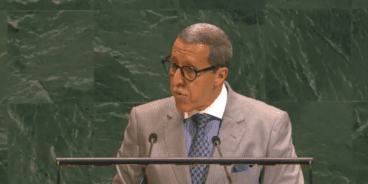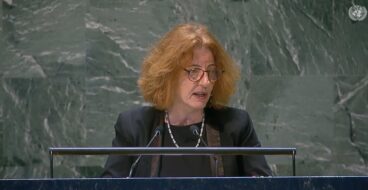
Statement delivered on behalf of the Group of Friends of R2P at the 2022 UN General Assembly plenary meeting on the Responsibility to Protect
The statement below was delivered by the Permanent Mission of Costa Rica on behalf of the Group of Friends of R2P at the UN General Assembly plenary meeting on the responsibility to protect and the prevention of genocide, war crimes, ethnic cleansing and crimes against humanity, 23 June 2022.
I have the honor of delivering this statement on behalf of the Group of Friends of the Responsibility to Protect, consisting of 55 Member States and the European Union, and this year co-chaired by Botswana, Costa Rica and Croatia.
We would like to thank Ms. Alice Wairimu Nderitu, UN Special Adviser of the Secretary-General on the Prevention of Genocide, for her statement. Today marks the thirteenth year that the UN General Assembly is gathering to discuss how to implement the Responsibility to Protect, and the fifth time in the format of a formal debate. We would also like to express our gratitude to all Member States who supported last year’s General Assembly resolution on the Responsibility to Protect, that formally mandated the Secretary-General to issue a report on R2P annually and that permanently included R2P as an item on the General Assembly’s formal agenda. The adoption of this resolution reflects the strong interest of the members in sharing ideas and best practice about how individually and collectively to improve our ability to prevent and respond to genocide, war crimes, crimes against humanity and ethnic cleansing.
We would like to thank the Secretary-General for his important thematic report entitled “Responsibility to Protect: Prioritizing Children and Young People.” We encourage the Secretary-General to include in his future reports also assessments of atrocity risks as well as recommendations for responses on national, regional and global levels.
Mr. President,
Children and youth are uniquely – and often disproportionately – affected by conflict and atrocities. Today, millions of children around the world are facing the risk of mass atrocity crimes, and their safety, protection, dignity and welfare are fundamental to the objectives of R2P. There are six violations against children during situations of armed conflict, as originally identified by Security Council Resolution 1261, including recruitment and use, abduction, killing and maiming, and rape or other forms of sexual violence. Depending on the circumstances, these violations may amount to either atrocity crimes themselves or an indication that an atrocity crime may be committed. In 2021, the UN reported 266,000 verified cases of such grave violations against children in more than 30 conflict situations over the past 16 years. Also, in non-conflict settings, we have witnessed children forcibly separated from their parents and deprived of their human rights on the basis of their identity.
Youth-led movements are demanding change in order to shape the world that they will soon inherit. In recent years, we have witnessed youth activists protest across the world to mobilize change. Young people are powerful agents of peace and security and their perspectives, expertise and voices must be heard and harnessed to inform atrocity prevention efforts.
Mr. President,
The world is currently facing alarming levels of violence, atrocities and displacement. R2P remains the key principle around which the international community can coalesce when vulnerable populations face the threat of genocide, war crimes, ethnic cleansing and crimes against humanity.
In this context, we would like to reaffirm our full support to the UN Office on Genocide Prevention and the Responsibility to Protect. As this is the first debate since Mr. George Okoth-Obbo was appointed as the Special Adviser on R2P, we especially would like to welcome him.
We encourage the Secretary-General’s two Special Advisers on the Prevention of Genocide and R2P to use their leadership roles to advance atrocity prevention and highlight risks in ongoing crises around the world. We welcome the Office’s statements on specific situations, thematic briefings and country analyses at various meetings, as well as the support the Office provides to Member States and regional organizations. We urge the Special Advisers to strengthen these efforts and to share their analyses with the wider UN membership and regularly provide the necessary early warning assessments and recommendations on how to prevent atrocities, including to the Security Council, General Assembly and the Human Rights Council. We also encourage the two Special Advisers to work with the Special Representative of the Secretary-General on Sexual Violence in Conflict, and to cooperate closely with the OHCHR, including its field presences and human rights components of peacekeeping and special political missions, as well as with relevant special rapporteurs and other specific UN human rights mandate holders and treaty bodies.
We welcome the Office’s plan to update the Framework of Analysis for Atrocity Crimes, including by developing additional technical guidance on the unique atrocity risks faced by women and girls and youth, and to promote its dissemination. As recommended in several of the Secretary-General’s reports, the Office should also produce an Atrocity Crimes Prevention Guidance for practitioners based on the Framework of Analysis for Atrocity Crimes. The Secretary-General may also consider following-up on the implementation of recommendations contained in his previous reports more systematically, possibly in the form of an annex to his yearly reports.
Mr. President,
The UN, Member States and other stakeholders, including civil society, continue to achieve important progress in advancing atrocity prevention at the local, national, regional and international levels. We also commend the initiatives of Member States to bring perpetrators of atrocity crimes to justice, including, where appropriate and in accordance with applicable international law, through the exercise of universal jurisdiction. Domestic accountability measures for atrocities are among the most effective ways to prevent recurrence. Fact-finding missions, investigative mechanisms, commissions of inquiry, hybrid and international courts and tribunals, including the International Criminal Court, provide complementary avenues to enable accountability when and where options under domestic law prove insufficient.
Frameworks created to identify upstream drivers, triggers and risks, the institutionalization of early warning and prevention mechanisms, and initiatives by networks of committed states, such as the Group of Friends of the Responsibility to Protect in New York and Geneva and the Global Network of R2P Focal Points, continue to contribute significantly to the prevention of atrocities.
Confronting the challenge of a divided Security Council not always able to take timely and decisive action in the face of atrocities, Member States have placed increased attention on the important role the General Assembly and the Human Rights Council can play in preventing and responding to atrocity crimes. Human Rights Council-mandated mechanisms, such as the Commission of Inquiry on Burundi and the Fact-Finding Mission on Myanmar, have utilized the UN’s Framework of Analysis for Atrocity Crimes to identify significant structural risk factors and potential triggers of atrocities, contributing to the development of strategies to prevent recurrence or further escalation.
Mr. President,
Despite national and global efforts to prevent the escalation of conflicts and protect populations, there are currently more than 100 million people displaced as a result of conflict, persecution and atrocities. This figure demonstrates why the responsibility to protect needs to be at the heart of our shared mission to advance peace and security, human rights and development.
When atrocity situations are emerging or ongoing, it is important for multilateral institutions, most notably the Security Council, and Member States to take timely and decisive action. The Security Council should consider situations where there is a potential for mass atrocities at the earliest stage possible, including through utilizing working methods such as situational awareness or horizon scanning briefings, Arria-Formula meetings, and by inviting the UN Special Advisers on the Prevention of Genocide and R2P as well as the High Commissioner for Human Rights to brief the Council.
We call on all Members of the Security Council to respond to and address the risk or commission of mass atrocities, noting in this context initiatives such as the ACT Code of Conduct and the French-Mexican initiative on the use of veto in case of mass atrocities. In this context, we also welcome the UN Member’s support for the recent General Assembly resolution aimed at holding the five permanent Council members accountable for their use of the veto.
We also recognize the important role national and international civil society can play in supporting the further advancement and implementation of R2P. Expertise of civil society actors can substantively inform discussions among policy- and decision-makers in relation to atrocity prevention and R2P, particularly through the inclusion of the voices and needs of local actors and communities directly affected by ongoing atrocities. We would like to thank the Global Centre for the Responsibility to Protect for their invaluable work as Secretariat of the Global Network of R2P Focal Points and the Group of Friends, both in New York and Geneva.
We also strongly support an inclusive approach to preventing atrocity crimes — one that recognizes the critical role women and youth play in early warning, peacebuilding, peacekeeping, capacity building, and developing more cohesive, inclusive and resilient societies. We should take concrete steps to end all forms of gender-based discrimination and violence and to empower women and youth as agents of change, including by promoting access to essential services and education, including human rights education, and meaningful participation in the decision-making processes affecting their lives.
Mr. President,
Today, during this Formal Debate, we look forward to hearing from Member States on best practices to end the current climate of impunity and inaction with regard to the risk of atrocity crimes across the globe. Let this debate be a reminder of the importance to continue this exchange of information and the need to strengthen our individual and collective prevention efforts.
Thank you.
Related Content


UN General Assembly Debate on the Responsibility to Protect, 2024
